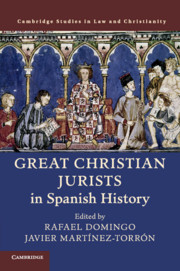Book contents
- Great Christian Jurists in Spanish History
- Law and Christianity
- Great Christian Jurists in Spanish History
- Copyright page
- Contents
- Illustrations
- Contributors
- Acknowledgments
- Introduction
- 1 Isidore of Seville
- 2 Raymond of Penyafort
- 3 Alfonso X
- 4 Francisco de Vitoria
- 5 Bartolomé de Las Casas
- 6 Martín de Azpilcueta
- 7 Domingo de Soto
- 8 Fernando Vázquez de Menchaca
- 9 Diego de Covarrubias y Leyva
- 10 Luis de Molina
- 11 Francisco Suárez
- 12 Tomás Sánchez
- 13 Juan Solórzano Pereira
- 14 Gaspar Melchor de Jovellanos
- 15 Francisco Martínez Marina
- 16 Juan Donoso Cortés, Marquis of Valdegamas
- 17 Concepción Arenal
- 18 Manuel Alonso Martínez
- 19 Álvaro d’Ors
- 20 Pedro Lombardía*
- Index
- References
5 - Bartolomé de Las Casas
Published online by Cambridge University Press: 24 April 2018
- Great Christian Jurists in Spanish History
- Law and Christianity
- Great Christian Jurists in Spanish History
- Copyright page
- Contents
- Illustrations
- Contributors
- Acknowledgments
- Introduction
- 1 Isidore of Seville
- 2 Raymond of Penyafort
- 3 Alfonso X
- 4 Francisco de Vitoria
- 5 Bartolomé de Las Casas
- 6 Martín de Azpilcueta
- 7 Domingo de Soto
- 8 Fernando Vázquez de Menchaca
- 9 Diego de Covarrubias y Leyva
- 10 Luis de Molina
- 11 Francisco Suárez
- 12 Tomás Sánchez
- 13 Juan Solórzano Pereira
- 14 Gaspar Melchor de Jovellanos
- 15 Francisco Martínez Marina
- 16 Juan Donoso Cortés, Marquis of Valdegamas
- 17 Concepción Arenal
- 18 Manuel Alonso Martínez
- 19 Álvaro d’Ors
- 20 Pedro Lombardía*
- Index
- References
Summary

- Type
- Chapter
- Information
- Great Christian Jurists in Spanish History , pp. 98 - 115Publisher: Cambridge University PressPrint publication year: 2018



